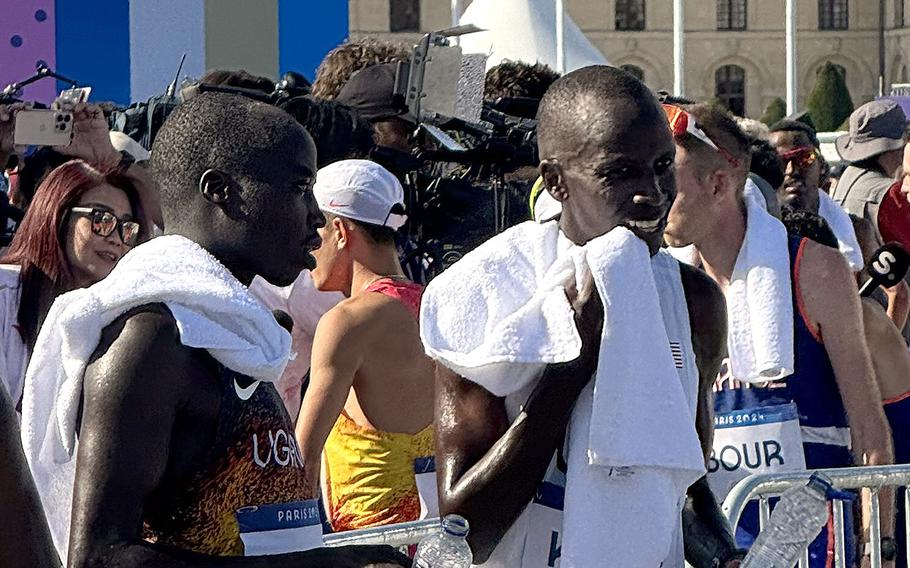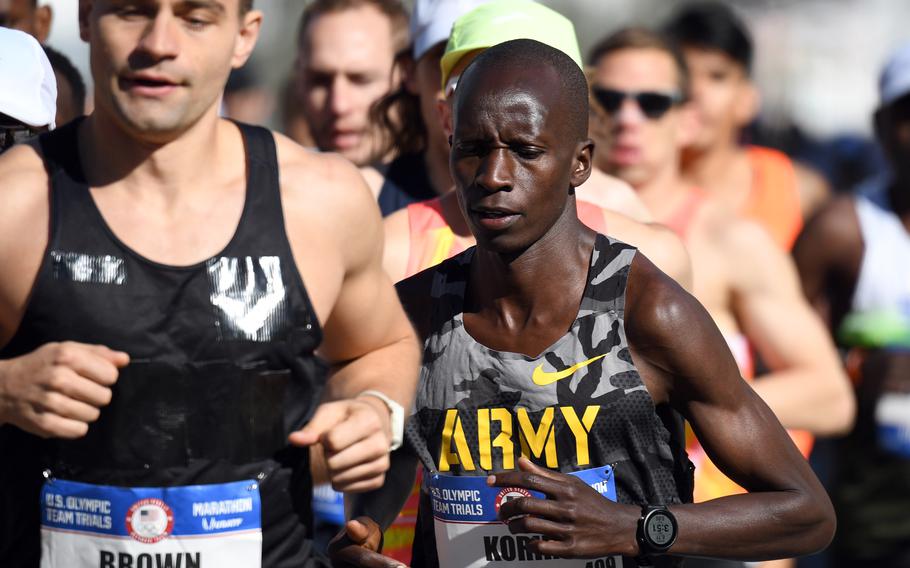
Army Staff Sgt. Leonard Korir listens to Uganda’s Andrew Rotich Kwemoi after finishing the men’s marathon at the 2024 Paris Olympics on Saturday, August 10, 2024, in Paris. The race marked Korir’s second Olympic experience after coming in 14th place in the men’s 10-kilometer race during the 2016 Rio Games. (Matt Wagner/Stars and Stripes)
PARIS — Leonard Korir already had a taste of the Olympics prior to Saturday, but he still couldn’t prepare himself for what he was facing.
Eight years ago, he stepped onto the track during the 2016 Rio Games in the 10-kilometer race.
In Paris, the 37-year-old Army staff sergeant ran another 32.2 kilometers — or 20 miles — in the city streets and surrounding areas in what many described as a hillier than a usual course.
Korir survived the terrain to finish in 63rd place with a time of 2 hours, 18 minutes and 45 seconds.
“It’s different. It’s a lot,” the member of the Army’s World Class Athlete Program said. “I’ve never run a race like this before, but I wanted to feel the challenge.”
Ethiopia’s Tamirat Tola set an Olympic record of 2:06.26 to win the gold medal. Belgium’s Bashir Abdi pulled away from Kenya’s Benson Kipruto for silver 21 seconds back from Tola, while Kipruto cross the line 2:07.
Fellow Americans Conner Mantz and Clayton Young came in eighth and ninth places, respectively, with times of 2:08.12 and 2:08.44.
The course that started at the Hotel de Ville in the center of Paris first took runners on a scenic route past iconic landmarks such as the Opéra Garnier and Louvre museum. Then the route went all the way to the grounds of the Palace of Versailles before looping back to Paris through a forest past the Eiffel tower to end at the Invalides monument garden.
Over the 26.2-mile course, participants climbed 1,427 feet (435 meters), facing a maximum gradient of 13.5 percent. Competitors also went downhill 1,437 feet (438 meters).
To highlight the track’s difficulty, 10 of the 81 participants did not complete the course. Among them was two-time defending Olympic marathon champion and the first person to record a sub-2-hour marathon Eliud Kipchoge of Kenya, who dropped out after 30 kilometers.

Staff Sgt. Leonard Korir runs during the U.S. Olympic marathon trials on Feb. 3, 2024 in Orlando, Fla., on his way to qualifying for the Paris Olympics. (Nathaniel Garcia/U.S. Army)
Heading into the race, Korir said he had one goal. Having missed out on Tokyo by three seconds before a third-place finish at the U.S. Olympic Trials in February to get a quota spot for Paris, he reiterated it often as he was on the route.
“I tell myself the most important thing is to finish the race,” said Korir, who was raised in Iten, Kenya, before coming to the United States in 2009. “I’m glad I finished. I represented the U.S.; I represented the Army.”
The first half was the more brutal part with the uphill portions, but Korir mentioned how the crowd spurred him on as he slowly climbed the standings.
For much of the race, he sat around 71st and 72nd place. The Iona College graduate slowly moved his way up the board eight spots over the final 12.2 kilometers.
“I like this one, a lot of people cheering on the course,” Korir said. “So, I used it, used the motivation from the people that were cheering as I was running.”
Considering the difficulty of the course, Korir, who joined the Army in 2015, said finishing gave him a lot of confidence to take over marathons like Boston and New York.
“You can run a race like this one …” Korir said. “You get a lot of experience. I just want to use this experience for motivation (for the future).”